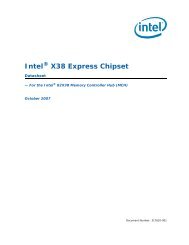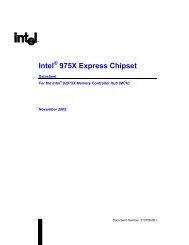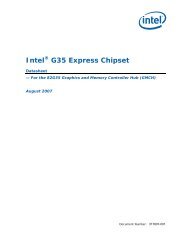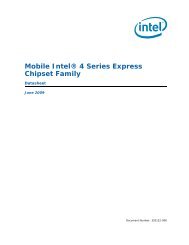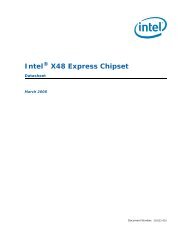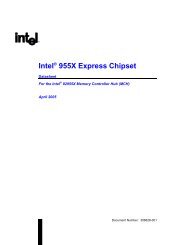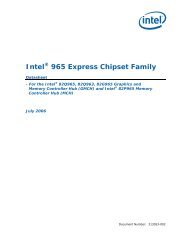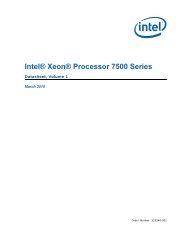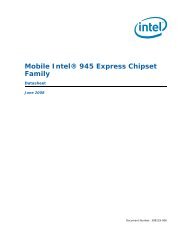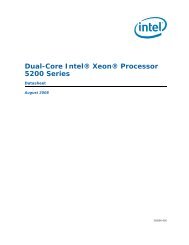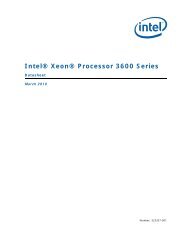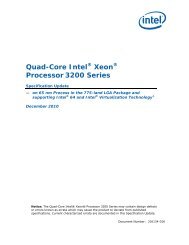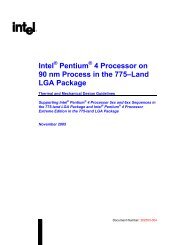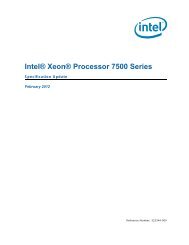Intel® 945G/945GZ/945GC/ 945P/945PL Express Chipset Family ...
Intel® 945G/945GZ/945GC/ 945P/945PL Express Chipset Family ...
Intel® 945G/945GZ/945GC/ 945P/945PL Express Chipset Family ...
Create successful ePaper yourself
Turn your PDF publications into a flip-book with our unique Google optimized e-Paper software.
System Address Map<br />
9.4.9 I/O Address Space<br />
The (G)MCH does not support the existence of any other I/O devices beside itself on the<br />
processor bus. The (G)MCH generates either DMI or PCI <strong>Express</strong> bus cycles for all processor I/O<br />
accesses that it does not claim. Within the host bridge, the (G)MCH contains two internal<br />
registers in the processor I/O space: Configuration Address (CONFIG_ADDRESS) register and<br />
the Configuration Data (CONFIG_DATA) register. These locations are used to implement a<br />
configuration space access mechanism.<br />
The processor allows 64 K+3 bytes to be addressed within the I/O space. The (G)MCH<br />
propagates the processor I/O address without any translation on to the destination bus and,<br />
therefore, provides addressability for 64 K+3 byte locations. Note that the upper 3 locations can<br />
be accessed only during I/O address wrap-around when the processor bus HA16# address signal<br />
is asserted. HA16# is asserted on the processor bus whenever an I/O access is made to 4 bytes<br />
from address 0FFFDh, 0FFFEh, or 0FFFFh. HA16# is also asserted when an I/O access is made<br />
to 2 bytes from address 0FFFFh.<br />
A set of I/O accesses (other than ones used for configuration space access) are consumed by the<br />
internal graphics device if it is enabled. The mechanisms for internal graphics I/O decode and the<br />
associated control are explained later.<br />
The I/O accesses (other than ones used for configuration space access) are forwarded normally to<br />
the DMI bus unless they fall within the PCI <strong>Express</strong> I/O address range as defined by the<br />
mechanisms explained below. I/O writes are not posted. Memory writes to ICH7 or PCI <strong>Express</strong><br />
are posted. The PCICMD1 register can disable the routing of I/O cycles to PCI <strong>Express</strong>.<br />
The (G)MCH responds to I/O cycles initiated on PCI <strong>Express</strong> or DMI with a UR status. Upstream<br />
I/O cycles and configuration cycles should never occur. If one does occur, the request will route<br />
as a read to memory address 0h so a completion is naturally generated (whether the original<br />
request was a read or write). The transaction will complete with a UR completion status.<br />
For Pentium 4 processors, I/O reads that lie within 8-byte boundaries but cross 4-byte boundaries<br />
are issued from the processor as 1 transaction. The (G)MCH splits this into 2 separate<br />
transactions. I/O writes that lie within 8-byte boundaries but cross 4-byte boundaries are assumed<br />
to be split into 2 transactions by the processor.<br />
9.4.10 PCI <strong>Express</strong>* I/O Address Mapping<br />
The (G)MCH can be programmed to direct non-memory (I/O) accesses to the PCI <strong>Express</strong> bus<br />
interface when processor-initiated I/O cycle addresses are within the PCI <strong>Express</strong> I/O address<br />
range. This range is controlled via the I/O Base Address (IOBASE) and I/O Limit Address<br />
(IOLIMIT) registers in (G)MCH Device 1 configuration space.<br />
9.4.11 (G)MCH Decode Rules and Cross-Bridge Address Mapping<br />
The following are (G)MCH decode rules and cross-bridge address mapping used in this chipset:<br />
� VGAA = 000A_0000 – 000A_FFFF<br />
� MDA = 000B_0000 – 000B_7FFF<br />
� VGAB = 000B_8000 – 000B_FFFF<br />
� MAINMEM = 0100_0000 to TOLUD<br />
220 Intel ® 82<strong>945G</strong>/82<strong>945G</strong>Z/82<strong>945G</strong>C GMCH and 82<strong>945P</strong>/82<strong>945P</strong>L MCH Datasheet



